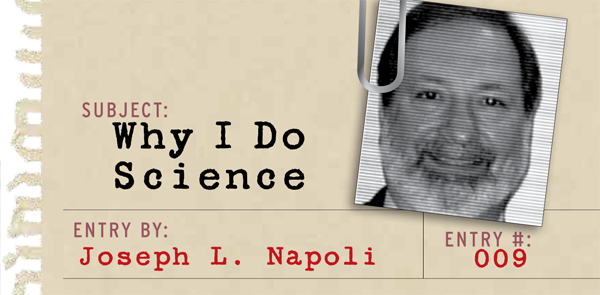
Why I Do Science
Joseph L. Napoli
Why do I pursue science? Quite frankly, I’m being paid to pursue my hobby! Ever since I was 8 years old and working (playing) with my chemistry set, waiting eagerly for new chemicals to arrive in the mail, I have been interested in how nature works and in creating new insights. This was stimulated by a visit to an exposition of models built from Leonardo da Vinci’s science and technology drawings. The 10x microscope I received as a gift generated further enthusiasm. Besides my curiosity about nature, the impact of discoveries such as penicillin convinced me that science and scientists could “save the world.” I was hooked, and was determined to become an erudite research professor.
I earned my undergraduate degree in chemistry, but became interested in biological applications and earned a Ph.D. in medicinal chemistry, an amalgam of organic chemistry, biochemistry, and pharmacology. During postdoctoral work I became interested in two fat-soluble vitamins, A and D. My broad training prepared me to apply both chemistry and biology to the study of these two chemicals, which are indispensable for life and have diverse biological functions.
Vitamins A and D are not given much thought by most people — even scientists — but the body converts each into a hormone, and each hormone has actions well beyond supporting vision and bone health, respectively. I have watched in amazement as the efforts of scientists have revealed unexpected insights, discoveries related to human health (both hormones stimulate the immune system and reduce the risk of cancer), and unanticipated twists (reproduction is impossible in the absence of both hormones). I feel privileged to have participated in these emerging fields.
In pursuing science, not much can be guaranteed other than that you will never be bored. The challenge is to develop the patience to conduct experiments carefully, so the results are valid and not compromised by a haste to reveal the intrigues of nature. I am grateful for public support for science, because it improves the human situation and funds my hobby.
Joseph Napoli is a professor in the Department of Nutritional Sciences and Toxicology, where he is also chair. His laboratory uses a combination of approaches to determine the physiological functions of retinoids.
